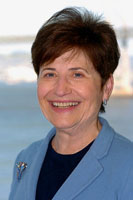 |
 |

MEDIA
In the near quarter-century that Phyllis Cook has headed the Jewish Community Endowment Fund, she's grown assets from $28 million to an impressive $2.8 billion. Of course, she hasn't done that alone. Some of the city's financial luminaries, from Claude Rosenberg to Warren Hellman to John Osterweis, have served on her investment committee. Other great philanthropists in the area, including the Haases, Koshlands, Oshers and Goldmans, have funds at the endowment. When it comes to families, perhaps none has been as important to growing sheer assets as Herb and Marion Sandler, the billionaire banking couple that contributed close to $1 billion to their supporting foundation at the endowment after last year's sale of Golden West to Wachovia. "Inherent in our success is the stability and stature of these people," said Phyllis Cook, executive director of the endowment, of how the endowment's succeeded and built on that success. Yet there must be more to building a successful charitable endowment than attracting the right lay leadership, or else Jewish federations and community foundations across the country would all have billion-dollar endowments. None of these people would donate through funds at the Jewish Community Endowment Fund if those funds weren't well managed. This roster of successful business people and philanthropists in turn serves as a recruiting tool to attract other, less affluent but no less generous, donors to the endowment. "People look to see who will be tough and businesslike with their charitable dollars," Cook said. "They want it stewarded well." The endowment has more than 880 donor-advised funds and 72 supporting foundations, and for the past several years has far surpassed all its investment performance benchmarks, said Richard Rosenberg, chairman of the Jewish Community Endowment Fund. Building to give "I don't want to focus on that 60 percent growth. It's wonderful that it happened, but we're not a bank," Rosenberg said. "We're not building the endowment fund for the sake of building numbers. We're building the endowment fund to give it away." Huge assets translate to a greater ability to contribute to the community. Last fiscal year, the Jewish Community Endowment Fund paid out $220 million. "This is our whole business, philanthropy," Cook said of the endowment, which essentially is like a community foundation. Most of the endowment's assets are donor-advised funds or supporting foundations; only $91.5 million of $2.8 billion is unrestricted. That unrestricted amount is key to the work that makes Cook most proud. First, it affords the endowment the ability to gird against emergencies, whether natural or man-made. This financial safety net, Cook believes, is the true purpose of the endowment: to safeguard the Jewish community against future financial need. The unrestricted funds also allow the endowment to respond to the greatest need it sees in the local community. It has seeded many of the largest Jewish capital projects in the region. It contributed $10 million to the Taube Koret Campus for Jewish Life, a $300 million project being built in Palo Alto, and it was instrumental in building the new San Francisco Jewish Community Center, which opened in 2004. That sets it apart from other federation endowments, which only give to projects they own and organizations under their umbrella, Cook said. Nor does the fund support only Jewish causes. When rents soared during heady dot-com days, the endowment provided seed funding, and a pocket of funders, to buy 131 Steuart St., where they are creating a nonprofit hub. Half of the building's 20 tenants are nonprofits, and not all of them serve Jewish causes. Jewish philanthropy "With philanthropy, as it has evolved in the past couple of decades, donors are now choosing multiple vehicles through which to execute their charitable giving," said Steven Lawrence, senior director of research at the Foundation Center. He added that a major trend in philanthropy is growth at identity-based funds, like Jewish federations. Other identity groups have been less successful at raising money, though they continue to focus their philanthropy as the endowment has. The Latino Community Foundation at the San Francisco Foundation, for example, is trying to raise under $2 million from Latino donors. Cook believes her endowment's grown because people started with small gifts and so liked the experience and results they continued to give in ever larger amounts. Other budding identity-based foundations hope to replicate that success. When she leaves the Jewish Community Endowment Fund next year, Cook will not leave philanthropy. She will help individual donors with their philanthropy and already has a few potential clients lined up. The work will be similar to what she does at the endowment, only on a much smaller scale. Cook began as a volunteer and became the endowment director in 1983. At that time, she and a secretary were the department. Then again, they had assets of $28 million versus $2.8 billion today. The Federation is looking first for a new executive director; after that it will seek a director for the endowment fund. "Phyllis is a legend in her own time," Rosenberg said. "When you lose a legend, you have to work twice as hard to replace what she has done." Rosenberg stressed that Cook leaves behind a well-trained team, and the leadership will remain top quality. He won't rule out the possibility of again seeing 60 percent growth. |
